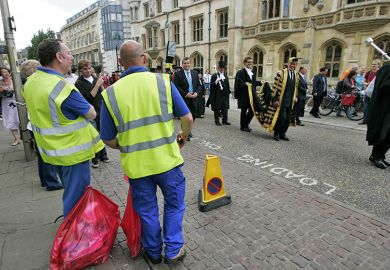Harold Macmillan famously told Britons that they had never had it so good. While it would be wrong to say the same of today's academics, the latest figures show that pay has improved markedly. Average pay stood at £41,128 across all grades of full-time academics for 2006-07, according to figures from the Higher Education Statistics Agency.
Analysis of the figures reveals that this is a rise of 12.6 per cent from £36,535 in 2004-05. Across the UK, the professorial average was £66,282, for senior lecturers and researchers it was £44,916, for lecturers £36,489 and researchers £30,161. Other grades - basically those academics not listed in the other categories - averaged £41,158.
Compare these with figures from the Office for National Statistics' Annual Survey of Hours and Earnings 2007 and academics come out well. The ONS report shows that professors now earn more than MPs (who earn £61,820, excluding their various allowances). They also trump pilots and flight engineers, who net £65,285, and the average solicitor, who earns £55,000. Lower down the ranks, lecturers and senior lecturers take home more than secondary school teachers (£34,000), civil servants (£23,000) and quantity surveyors (£36,455).
Not to be outdone, vice-chancellors have been rewarded handsomely. Their average salary rose by 8 per cent in 2006-07, taking average pay to £177,844 (including benefits in kind), according to the Times Higher Education-Grant Thornton survey of vice-chancellors' pay. Universities' average contribution to vice-chancellors' pensions was £22,452. In total, the UK's university heads were paid £ million.
The changes put vice-chancellors on a par with, and ahead of, many public-sector heads. For instance, the basic salary for chief executives of primary care trusts serving more than 1 million people is just over £144,000.
But vice-chancellors still lag behind the private sector. According to the ONS, chief executives of major organisations earn an average of £214,000. Of course, some will enjoy remuneration packages that dwarf even the highest paid vice-chancellors, but few would expect the head of a university to earn as much as the chief executive of a multinational conglomerate.
Given that pay can be seen as a proxy for social status, the latest figures indicate that academe is regaining some of the status lost over the past 30 years or so, a period characterised by a decline in academic salaries relative to comparable professions. Of course, some professions - medicine is an obvious example - remain generally better rewarded. But even here the gap is narrower than academic averages suggest and there is a small but growing band of senior academics who are earning six-figure salaries.
Thanks to the implementation of the pay framework over the past two years, average pay is higher than the most recent Hesa figures show. It will take a year or two for the full effects of the framework pay rises to show up in the Hesa record.
Macmillan's reason for telling people they'd never had it so good was to sweeten a subsequent call for pay restraint. The big question is whether this growth in higher education pay is affordable and sustainable. The cost of increased pay and pensions contributions will hit universities hard this year and next, and managers are seriously concerned about the brewing financial storm.
What is pretty much certain is that the recent flurry of pay rises - averaging 12.6 per cent between 2004-05 and 2006-07 - will abate. Whether this amounts to a stabilisation or out-and-out belt-tightening depends on the economic outlook for universities.
In considering academic pay, it is important to realise that academics compare well against other professions in the ONS survey because groupings such as solicitors and civil servants will include many in junior posts that drag down the average. Conversely, the staffing profile of higher education means that there are large proportions of academics grouped at the top of their pay grade.
The impact of this is considerable and best illustrated by looking at the average pay at the University of Oxford. At £38,339 across all grades, it is 93 per cent of the UK average. One reason for this is that as a world-leading research university it employs large numbers of early-career researchers who earn relatively little, which serves to pull down the average. Another reason may be that it appears to underpay its senior lecturers (£39,147) and lecturers (£34,776), compared with the national averages of £44,916 and £36,489 respectively.
However, Oxford pays its researchers an average of £34,343 compared with the UK average of £30,161. Its professors, too, earn significantly above the national average, at £75,5, against a UK figure of £66,282. Its female professors get £75,828 (against a national female average £62,261), besting their male counterparts' average salary of £75,503 (UK average £67,134).
There are also stark differences in salaries paid by the different groups of universities. Analysis by Hesa shows that Russell Group universities pay an average of £41,819, 1994 Group institutions pay £41,666 and Million+ institutions pay £39,684. The more senior you get, the greater the difference. The professorial average in Russell Group institutions is £70,097, in the 1994 Group it is £64,689 and in Million+ it is £55,419. The last figure is 79 per cent of the Russell Group average.
The differences in average pay between universities are no less illuminating. Take two London institutions, the universities of Kingston and Thames Valley. At Kingston, the average pay is £57,173, while at Thames Valley it is £34,979. Another contrast can be seen at two old universities, Aberdeen and Strathclyde. Professors at Aberdeen earn on average about £7,500 more than their counterparts at Strathclyde, and the institution's senior lecturers earn an average of £4,600 more than their Strathclyde peers.
Roger Brown, co-director of the Centre for Higher Education Research at Liverpool Hope University and a former vice-chancellor, predicts that disparities in salary across all grades and institutions will increase.
"As the variable fee income comes in, there are beginning to be market differences in what universities pay. The wealthier universities are going to be paying their research stars much more and a real differentiation will occur in the sector, as it has already in the US. Salaries are going to vary more and more."
Peter Scott, vice-chancellor of Kingston, which is the second highest paying university after the London Business School, is not surprised by the figures. "We recognise the importance of properly rewarding high-quality and very loyal staff," he says. "They have been critical to our substantial growth and success over the past ten years."
So why does a university just a few miles away have one of the lowest average pay rates? A spokesperson for Thames Valley dismissed the figures as an unfair reflection of a complex payment policy.
"The Hesa statistics record only salary grade and do not differentiate between levels within the institution or between further and higher education. Further education accounts for over 60 per cent of enrolments at Thames Valley University," the spokesperson says. "Therefore a large number of our staff are on the lecturer pay scale, which has the effect of weighting the overall average salary of our full-time academic staff."
Averages disguise such factors, but they are unlikely to explain away all the difference between what in this case appear to be two broadly similar institutions.
A market is evidently at work. Some institutions are acutely aware of this and of the need to address pay issues accordingly. For instance, academics at the University of Wales, Lampeter, earned an average of just £33,578 in 2006-07. A spokesman says that while salaries are nationally determined, Lampeter's lower average figure is due to a high proportion of young academic staff just starting out in their careers. "Recently, we have been successful in recruiting young high achievers. Indeed, it has been said that Lampeter is the place where the 'bright young things' go for their first academic job.
"Some of these young staff stay in Lampeter and receive promotion, while others leave for employment elsewhere in academia and are replaced through the recruitment of other young staff. We are nearing completion of the job evaluation scheme, and any anomalies in individuals' salaries will be addressed at its conclusion," he said.
At the other end of the scale London Business School, with a mean salary of £132,769, says its pay rates are based on a market analysis of its competitors. It monitors salaries at the business schools at Harvard University and Wharton, University of Pennsylvania as well as at other professional schools, including those of medicine and law.
"There is a shortage of well-trained business school faculty, there is a booming demand for their services and many of them can, if they choose, walk into highly paid jobs in the world of finance or industry," says Julian Birkinshaw, deputy dean of programmes. "London Business School strives to be the pre-eminent global business school, so it has to pay salaries that allow it to compete for talent."
The overall rise in academic salaries may help to attract new people to academe, says Birkinshaw. "Many highly talented people opt for careers in business or other professions rather than careers in academia, partly because of the historically low salaries."
There is less good news when it comes to the gender pay gap. Women earn almost 16 per cent less across all grades than men. Again, there is considerable variation between institutions. (The complete Hesa tables, available at www.timeshighereducation.co.uk, offer a breakdown of salary by gender.)
At the Royal Veterinary College the pay gap is per cent. Its principal, Quintin McKellar, attributed it to the low number of women who studied to become vets in previous decades.
"Twenty years ago, 90 per cent of veterinary students in the UK were male. This is why there are more males than females in senior positions at the college. We expect this ratio to change dramatically in future, as about 90 per cent of our current students are female," he says.
The biggest gender pay gap at professorial level is at Swansea University. Its female professors receive just over 15 per cent less a year on average than their male counterparts. The university disputed the figures, saying that it had undertaken an equality pay review.
"All professorial salaries are now reviewed on an annual basis using a methodology that specifically benefits lower-paid female professors," a spokesperson says. "As a result, the pay gap between male and female professors, excluding those on clinical rates, has significantly narrowed to only 5.6 per cent and is set to narrow again this year.
"The figures have been skewed by the inclusion of clinical academic staff, whose salaries are significantly higher. These salaries are outside the university's control as they are set by national review bodies."
Conversely a few institutions, including Oxford and Bucks New University, record higher average pay for their female professors. At Bucks New, the mean salary for female professors is £57,092 compared with £54,820 for men, a 4 per cent difference.
The University and College Union has welcomed the latest figures. A spokesman said: "The UCU has been campaigning hard for catch-up as well as keep-up in pay, and these figures show the fruits of this campaign. We believe rises in average pay show how the framework agreement is benefiting new recruits to the sector, which is vital if higher education is to recruit and retain the high-calibre employees needed to keep pace with the growth in student numbers."
Universities UK claims that institutions are committed to providing equal opportunity in academe and that it supports the Equality Challenge Unit in addressing these issues. "The sector has made substantial progress in recent years, but we are not complacent and recognise that there is more to be done. Redressing gender imbalances in academia, such as at senior level, is a long-term goal for the sector," says a spokesman.
There are none more senior in universities than the vice-chancellors and, according to the annual Times Higher Education league table of salaries compiled by financial services company Grant Thornton from universities' own figures as published in their annual accounts, they saw their 2006-07 salaries increase by 8 per cent compared with 2005-06.
The highest paid was Sir Richard Sykes of Imperial College London. He received £348,000 in 2006-07. The University of Nottingham's Sir Colin Campbell (since succeeded by David Greenaway) received £308,103 in 2006-07. He also had an additional pension income of £46,897.
A spokesperson for Imperial College says that all staff salaries are considered annually and take into account the demands of the job and successes achieved.
"Since coming to Imperial in 2001, Sir Richard Sykes has implemented a number of initiatives to consolidate Imperial's position as an internationally competitive institution, including the establishment of a number of centres and institutes focused on inter-disciplinary research and the creation of the UK's first Academic Health Science Centre.
"Sir Richard's success is underlined by the fact that during his rectorship Imperial has been rated the fifth best university in the world." The university also confirmed that it did not pay any pension contribution for him.
The greatest remunerative increase recorded in the 2006-07 accounts went to Diana Green, former vice-chancellor of Sheffield Hallam University. Green received a £123,000 early retirement payment on top of her salary of £181,000, taking her total package to £304,000 for 2006-07. Her final basic salary for 2006-07 amounted to an increase of 9 per cent on the year before.
"We understand this was above the average increase for that year but it brought her salary to the median for the sector and reflected the university's previous year's performance, which put it near the top of its peer group," a Sheffield Hallam spokesman says.
"The vice-chancellor retired early, on 31 July 2007. To ensure that she was not disadvantaged in pension benefits as a result of her early retirement, a payment was made to a pension fund. The cost of protecting her benefits was £121,000."
The Higher Education Funding Council for England issued pensions guidelines in 2002, calling on universities to avoid making large severance payments that in effect boost salary on the year of retirement.
At the time, the Hefce chief executive Sir Howard Newby sent letters to the chairs of governing bodies, saying: "The public rightly expects that bodies that receive large sums of public money to provide a public service should ensure that the pay of their chief executive is proportionate. It is part of my role to ensure that the public funds we allocate to universities and colleges are not being misused."
There is no suggestion that Sheffield Hallam breached the Hefce guidelines.
But Roger Brown said there was little that could be done about large payments on early retirement, even if they are frowned upon.
"It's only guidance. If the governing body and the auditors both agreed it, then there's very little that can be done about it. Governing bodies are sovereigns. They're not accountable to anybody. There are no hard and fast guidelines," he said.
Other large salary increases were also put down to issues over pension contributions.
At the Institute of Education, Geoff Whitty saw his income rise by 37 per cent to £204,835. The institute said that the salary figure reflected a one-off payment compensating him for previous underpayment of pension.
"In considering the director's salary, the institute's remuneration committee took into account the contribution of the director to a sustained period of exceptional performance by the institute, together with salary levels in comparator institutions," Lady Elizabeth Valance, chair of the institute's council, says. "The level of increase agreed brought the director's salary back into line with comparable institutions following a freeze on senior salary increases in the preceding year."
Sir Colin Campbell, vice-chancellor of the University of Nottingham, saw his salary rise by per cent to £308,103. A spokesperson said it also incorporated pension payments from previous years and that his actual salary rise was 8 per cent, the average across the sector.
Topping the list of pensions contributions for 2006-07 was Durham University's vice-chancellor Sir Kenneth Calman, who received an additional £104,000 towards his pension.
The university explains that the Pensions Act 2006 removed the earnings cap on the pension entitlement of certain higher paid staff, including Sir Kenneth, who retired last year. The cost of increasing his pension is reflected in financial statements for 2006-07.
At Glasgow Caledonian University, vice-chancellor Pamela Gillies' rise of 123 per cent, from £77,000 to £172,000, was attributed to accounting changes. The figure for the previous year was a part-year calculation and the final salary for 2005-06 was £157,000.
Sally Hunt, general secretary of the UCU, criticised the 8 per cent rise enjoyed by vice-chancellors. "Vice-chancellors' pay continues to fall outside the type of scrutiny their staff are subjected to and how they merit big increases is never properly explained," she says.
Hunt believes that vice-chancellors should receive performance-related pay, like many academic colleagues.
"If they do perform well enough to merit reward then they should receive a bonus, rather than a massive pay boost that tops up their final-salary pension scheme. It is vital that universities ensure there is proper scrutiny of vice-chancellors' pay and pension provision if we are to avoid suspicions of one law for those at the top and another for the rest."
But David Fletcher, secretary of the Committee of University Chairmen, disagrees, saying that senior salaries are set fairly.
"It needs to be emphasised that vice-chancellors play no part in determining their own salaries," he says. The CUC maintains a database to assist university remuneration committees in making comparisons.
"The key point is that vice-chancellors do not set their salaries," concurs Steve Smith, chair of the 1994 Group and vice-chancellor of the University of Exeter (salary £210,000).
"At Exeter the chair of council and other lay members use comparative data on salaries and benefits for vice-chancellors, which they get from the CUC, and they also look at performance - I have no input into the salary review. Vice-chancellors are very well remunerated, but were they running private organisations of a similar size, they would be earning more," he said.
According to the Universities and Colleges Employers Association, figures from the IDS Executive Compensation Review published in 2007 show that vice-chancellors' pay increases are still far below those for public-sector chief executives, who received an average pay boost of almost 17 per cent last year.
UUK says that the average salary increase of 8 per cent was comparable to chief executive salary rises in the other sectors. The ONS figures indicate that the directors and chief executives of major organisations received an increase of 6.8 per cent last year.
"Universities are highly complex businesses with an average annual turnover of over £100 million," a UUK spokesperson says. "When appointing a new vice-chancellor, governing bodies need to ensure that they can attract the best quality applicants for their organisations. Competitive pay is part of the package."
"Like chief executives, vice-chancellors have a hugely significant impact on the success of their institutions," Wendy Piatt, director-general of the Russell Group, adds.
Bucking the inflationary trend, the University of East London and Brunel University both recorded significant drops in their vice-chancellors' pay packets, 26 per cent and 25 per cent respectively.
In both cases, the pay alterations were attributed to changes at the top. At East London, part payment of the salaries of both outgoing vice-chancellor Mike Thorne and newly hired Martin Everett were included in this year's figure. But Everett's salary is £150,000, compared with Thorne's annual pay of £162,000.
But what motivates vice-chancellors is clearly not just money, and there is a rather captive market for their skills - universities are not typically using salaries to attract external candidates to the role.
Roger Brown highlights another important issue; the disparity between vice-chancellors' income and that of their immediate team.
"If you compare them with equivalent private-sector organisations they're almost certainly underpaid. If you compare them with their deputies or pro vice-chancellors they're overpaid," Brown says.
Vice-chancellors are exceptional within the academy, but the picture for academics across the board looks good. The overall increase of 12.6 per cent across all grades between 2004-05 and 2006-07 indicates that academic pay is edging ahead of other comparable sectors. Thanks to the national pay framework, further significant increases in academic pay should feed through into the Hesa record over the next two years.
The sector must make no mistake: the boost to academic pay is long overdue. Higher education's staggering achievement of maintaining academic quality while student numbers went through the roof and funding per student through the floor was due entirely to the dedication of university staff.
Pay rises should not be seen merely as deferred reward for past services. Higher education's centrality to society and the economy grows with each year. New challenges lie ahead, not least in the provision of skills education to the UK workforce. Academic status, part of which derives from financial reward, must reflect the growing importance of higher education to the UK.
And yet universities are not City firms or blue-chip companies. They are not built for profit, and their ability to raise more income is limited by Government, which sets the cap on tuition fees. As a result, the big challenge lies in making a fair assessment of how much more universities can afford to pay their staff.
FORECAST: SECTOR MAY STRUGGLE TO PAY ACADEMICS' WAGES, SAY UNIVERSITY HEADS
Three factors will combine to make 2008-09 an expensive year for the sector in terms of staff costs.
The higher than expected pay rises, a new national pay spine - which has seen salaries rise across the sector - and rising pension costs mean some universities may struggle to afford their wage bills.
Under the three-year national pay deal for academics agreed in 2006, the third year's increase will be 2.5 per cent or the retail prices index for September 2008, whichever is the larger figure.
Inflation has pushed the RPI up since 2006. It hit 4.1 per cent this January, although analysts predict that this will fall to 3-3.5 per cent by the autumn.
At the same time, figures from the Universities and Colleges Employers Association suggest that the national framework agreement has resulted in more upward regradings than "pegging" through "red-circling" - having their pay frozen. Ucea's most recent survey of the new pay structures indicates that more than twice as many roles were "green-circled" - given a pay upgrade after an evaluation of their responsibilities - as red-circled.
Universities are also having to pay more into local pension schemes for clerical and manual workers, with several institutions now paying about 20 per cent of salaries as pension contributions for these workers.
This month the Universities Superannuation Scheme pension fund will be revalued. If a deficit in the fund is identified, a rise in employer contributions, which currently stand at 14 per cent of salary, is likely to follow next year.
Steve Smith, the vice-chancellor of the University of Exeter and chairman of the 1994 Group, describes it as a time bomb.
"You don't have to be paranoid to think that in 2009 the sector could be looking at a 5 per cent increase in pension contributions for USS members. How are universities going to pay for that?
"We have seen two years of significant pay rises, which the workforce wholly deserved, but with no additional income from fees. There will be pressure," he says.
The Higher Education Funding Council for England revealed last month that university borrowings are already at their highest levels since 1997.
"Things are going to get tougher, particularly in Scotland, where the financial settlement for this year was 3 per cent, while institutions are facing a 7 per cent increase in salaries," Jocelyn Prudence, chief executive of Ucea, says.
Phil Harding, chairman of the British Universities Finance Directors Group, says: "Institutions are making surpluses of between 1 per cent and 3 per cent of turnover. They are not projected to increase much beyond that, even if tuition fees are raised."
While he does not anticipate large-scale redundancies, Mr Harding predicts "small-scale, targeted job losses" as universities stop providing courses in less profitable disciplines.
The University and College Union questions claims that the sector cannot afford recent pay rises. It stresses that universities received more than £880 million in recent years under the Rewarding and Developing Staff initiative.
"This has given higher education institutions adequate time and resources to prepare for the increase in spending on staff through the pay framework agreement," says a UCU spokesman.
"Although English higher education institutions last year forecast that the sector would be in operating deficit in 2006-07, thereafter the sector is forecast to be in operating surplus after absorbing the impact of increased staff costs.
"Again, higher education institutions have had time to factor increased pension costs - through the framework agreement and through changes in financial reporting standards - into their budgeting process, and are looking forward to surplus from 2007-08."
UCU pensions expert Terry McKnight, on the USS board, says that the USS scheme was unlikely to show a major deficit. "It's an immature scheme; there are more people paying in than those who are benefiting," he says.
Register to continue
Why register?
- Registration is free and only takes a moment
- Once registered, you can read 3 articles a month
- Sign up for our newsletter
Subscribe
Or subscribe for unlimited access to:
- Unlimited access to news, views, insights & reviews
- Digital editions
- Digital access to THE’s university and college rankings analysis
Already registered or a current subscriber?









